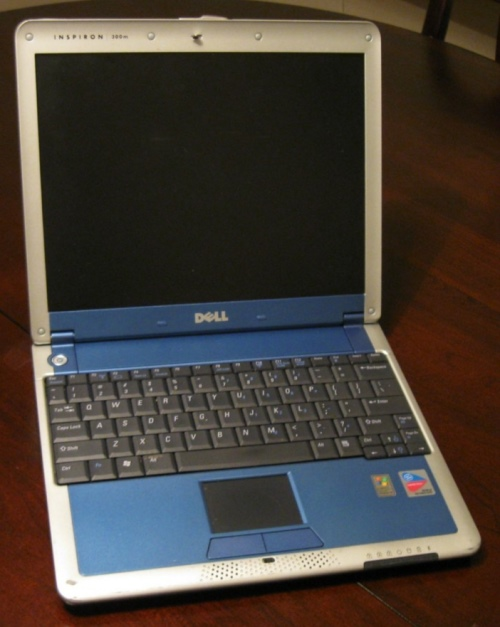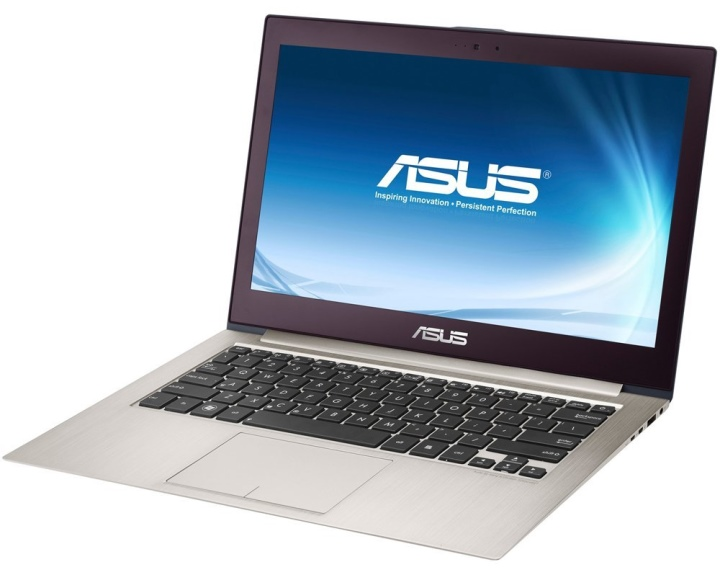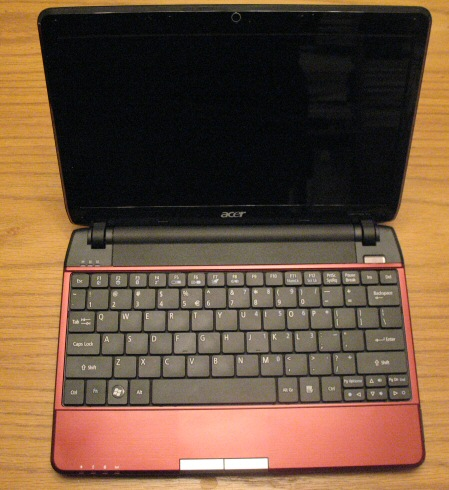The Last PC Laptop
I’ve been chasing the perfect PC laptop for over a decade now.
Though I’ve tolerated lugging around five to seven pound machines because I had to, laptops were always about portability first and most of all to me. I quickly gravitated to so-called ultraportable laptops as soon as they became available. The first one was the 2003 Dell Inspiron 300M. It was the first laptop I found that delivered a decent 3-ish pound package without too many compromises. How I loved this little thing.

But there was a downside to that 2003-era ultraportability – the default battery in the system provided about 2 hours of runtime. Switching to the larger battery extended that to a much more respectable 5.5 hours, but it also added a pound to the system and protruded from the rear a bit.
I’ve pursued the same dream of reasonable power with extreme portability ever since, with varying degrees of success. The PC industry isn’t exactly known for its design leadership, and it can be downright schizophrenic at times. So if you were a fan of laptops that were actually thin and light and portable, it’s been rough going for a long time. 2007’s Dell XPS M1330 was a brief bright spot, but honestly, it’s only in the last few months I’ve found an ultraportable that lived up to my expectations, one that I feel confident in recommending. That laptop is the Asus Zenbook Prime UX31A.

Having lived with this laptop for about two months now, I can safely say it is without question the best PC laptop I’ve ever owned. Consider the Tech Report review and the Engadget review, both rave. Here’s what you need to know:
- Retina-esque 1920x1080 resolution in an amazingly high quality 13.3" IPS display
- Intel’s latest 17 watt Ivy Bridge processor with (finally!) decent integrated graphics
- 128 GB SSD with fast 6Gbps interface
- Just under 3 pounds
- Decent 6 hour runtime
- Classy brushed metal case and cover
All of this for about $1,050 at the time of writing. If you’re suffering through a sub-par TN display on your current laptop, the awesome IPS display is almost worth an upgrade on its own. After switching to bargain Korean IPS displays on the desktop, I’m desperately hoping my poor eyeballs never have to endure another awful TN LCD display for the rest of my life.
This is a machine that pleasantly surprised me at every turn. The keyboard is solid feeling with a dimmable backlight, and the Achilles heel of all PC laptops, the trackpad, is about as good as it ever gets on PCs. Which is to say still not great. Even the power adapter is classy, although highly derivative of Apple. While this is substantially closer to the ideal ultraportable hardware I’ve had in my brain since 2003, it still exhibits some of the same problems I experienced with that Inspiron 300M almost 10 years ago:
- An operating system pre-loaded with useless craplets and pointless bloatware, all in the name of hypothetical value add by the vendor and/or marketing subsidies.
- Several branding stickers I had to peel off the machine after I opened the box. (Note that the press photos for a machine never include these ugly stickers. Go figure.)
- A trackpad that works kinda-sorta OK, but never quite inspires enough confidence that I can stop carrying an external mouse around in my laptop bag with me.
The first thing I did when I got the laptop was wipe it and install the Windows 8 preview, and soon after updated it to the final Windows 8 release. Despite all the grousing about the tablet-centric nature of Windows 8 – some of which is warranted, but can easily be ignored entirely – I am an unabashed fan of the operating system. It is a big improvement over Windows 7 in my day to day use. The more I use Windows 8 the more I believe it’s the biggest step forward in Windows since Windows 95. So what I’ve put together here is probably the best, most platonic ideal form of Wintel laptop hardware you can buy in mid-2012.
(In the interests of full disclosure, I actually own two of these. One for my wife and one for me. Because I am an inveterate hotrodder, I had to have more memory and a larger, faster SSD. So I bought the UX32VD model which has a discrete Nvidia 620M GPU and, most importantly, can be upgraded internally. So I dropped in a Samsung 830 512 GB SSD and 8 GB DIMM. This led to a slightly oddball final configuration of 10 GB RAM and an internal embedded 32 GB SSD plus the 512 GB SSD. It hurts battery life by at least an hour, too. You should also know that the teeny-tiny Torx screws on the back of this laptop are not to be trifled with. Bring your jeweler’s loupe. In case it wasn’t already abundantly clear, let me spell it out for you: going this route is not recommended unless you are as crazy as I am. The base model is really nice! Trust me!)
If pressed, I might admit the combination of ASUS Zenbook Prime hardware and modern Windows 8 amenities lives up to the whole Intel “Ultrabook” marketing schtick. But I’m not sure that’s enough any more.
Every time I leave the house – heck, every time I leave the room – I have to decide what kind of computer I’m going to take with me, if any. Besides the ultraportable laptops, I now own an iPhone 5, several retina iPads, and a Nexus 7. I’m sure there are many more of these devices on the way. In the calculus of deciding what kind of computing device I want with me, even the most awesome ultraportable laptop I can find is no longer enough. Consider:
- Want 10 hours of real world battery life? Even when doing actual work that would ramp the CPU up? Many tablets and phones can achieve that magical 10 hour battery life figure, but it will be a long, long time before you reliably get that out of any ultraportable laptop. Personally, I blame x86.
- Want to start doing stuff immediately? Even Windows 8, which has radically improved wake times, is laughably slow to start up compared to tablets and phones which are practically instant-on by design.
- Want the smallest most portable device you can get away with? It’s unlikely that will be a laptop, even an ultraportable, because of the implied keyboard and connectivity ports, plus the big screen and hinge. There is no form factor more compact than the touchscreen tablet. And you’ve got to take your phone along in any case, because that’s how your family and loved ones will contact you, right? Have you seen the iPhone 5 benchmarks? It’s faster than most tablets!
- Want to be always connected to the Internet? Sure you do; how else can you get to Stack Overflow and Stack Exchange for all of life’s essential questions? Then you probably need some kind of cellular support, for 3G or 4G or LTE or whatever the telephone companies are calling high speed Internet access these days. That is quite rare on traditional laptops, but obviously common on phones and much easier to find on tablets.
- Want easy access? Just try opening a laptop on a crowded subway train or bus. Or with, say, 3 toddlers running around your house. I dare you. But phones and 7" tablets offer easy one handed operation; you can whip them out and fill whatever time you have available, whereas cracking open a laptop feels like a sizable commitment in time and space to doing something.
My laptop is increasingly a device I only take when I know I’ll need to do a lot of typing, and/or I’ll need a lot of screen space to work. But even a phone could do that if it had decent support for Bluetooth keyboards and external displays, couldn’t it? And even a few programmers, the audience who would most need all the power and flexibility of laptops, are switching to tablets.
I’ve waited 12 years for the PC industry to get its collective act together and, if nothing else, successfully copy Apple’s laptop hardware designs. Now that they (mostly) have, I wonder: is it too late? Has the PC industry irrevocably shifted underneath them while they were so busy pumping out endless refinements to generic x86 boxes? I love this new laptop, and in many ways it is the perfect ultraportable hardware I dreamed of having in 2003. But every time I power it up and use it, I feel a little sad. I can’t shake the feeling that this might end up being the last PC laptop I ever own.






